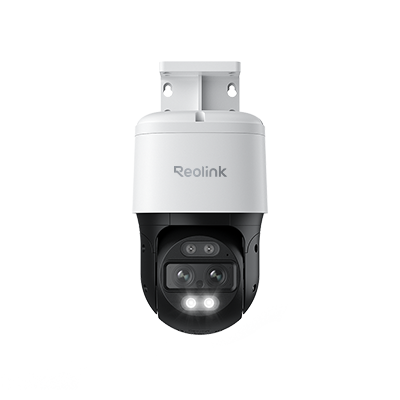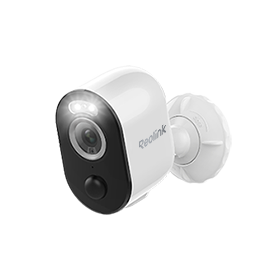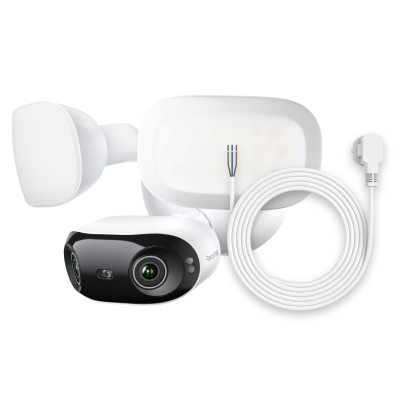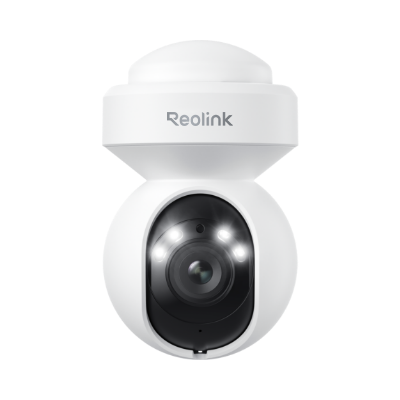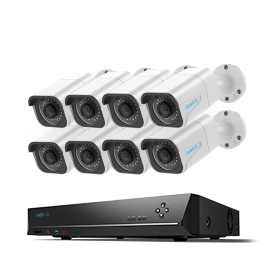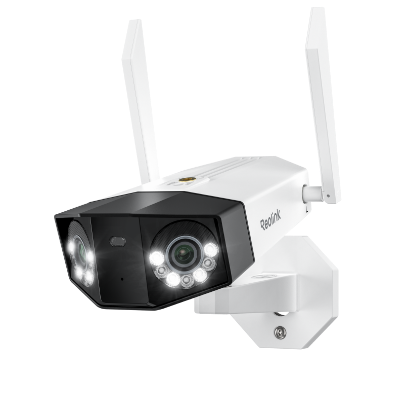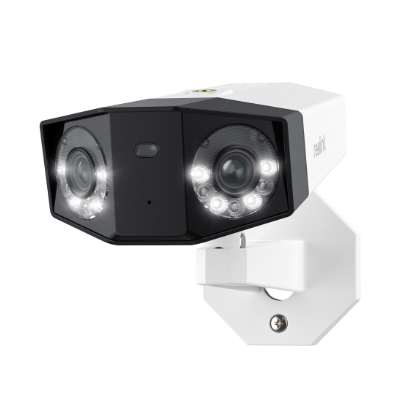2K vs 4K Security Camera: Which One Is Right for You?
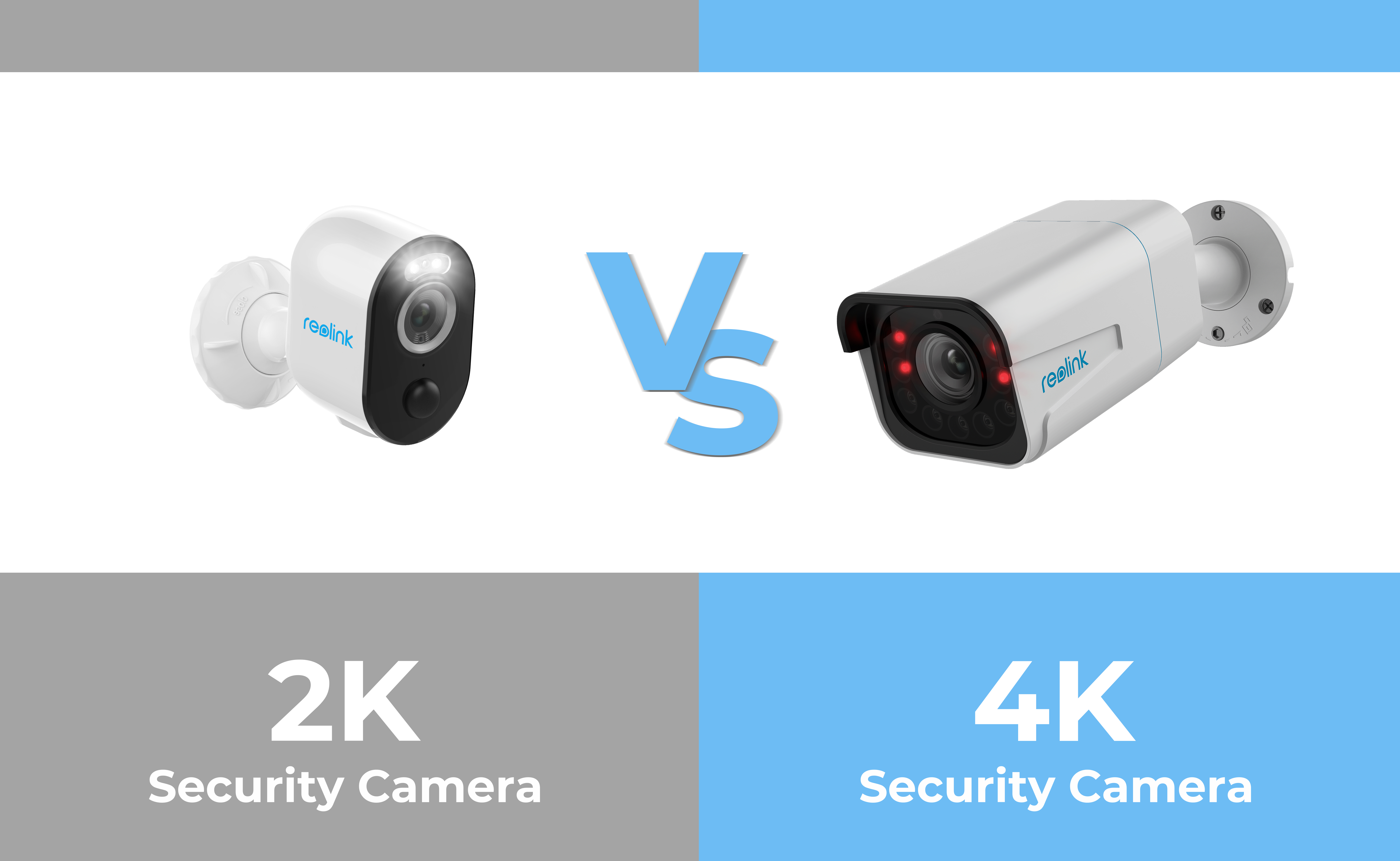
Gone are the days when security cameras were limited to grainy 720p footage. Today, HD IP cameras capture crisp images at 1080p and beyond. With so many options on the market, choosing the right camera can be confusing. This 2K vs 4K security camera guide breaks down the differences between 2K (2000+ pixels) and 4K (4000+ pixels), helping you determine which resolution best suits your security needs.
2K vs 4K Security Camera: Resolution and Megapixels
Before comparing 2K and 4K security cameras, it’s important to understand how image quality is measured. Resolution describes the level of detail in an image or video and is usually expressed as the number of pixels in width and height. Higher resolution means clearer images and finer details.
2K camera resolution and megapixels
For 2K security cameras, the typical resolution is 2560 × 1440 pixels, also known as 2K Super HD. This equals 3,686,400 total pixels, or approximately 4 megapixels (4MP). The term “2K” refers to the image having roughly 2,000 pixels across the horizontal axis, while “4MP” represents the total number of pixels in the image. In practice, 2K and 4MP usually describe the same image quality level in security cameras.
4K camera resolution and megapixels
A 4K security camera offers a much higher level of detail. Its standard resolution is 3840 × 2160 pixels, totaling 8,294,400 pixels, which is commonly referred to as 8 megapixels (8MP). The name “4K” comes from the nearly 4,000 pixels across the horizontal axis.
Because of this higher pixel count, 4K (8MP) cameras capture sharper images, making it easier to identify fine details such as faces, license plates, and distant objects. In general, megapixels describe the total number of pixels, while terms like 2K or 4K indicate how those pixels are distributed across the image.
2K vs 4K Security Cameras: Basic of Them
Now that we have covered the meanings of resolution and megapixel, you may wonder what the differences between 2K and 4K mean for your security system. Let’s look at the differences between them and some unique features of each.
2K Security Camera
2K security cameras have dominated the market for years. There have been several updates over time, and right now there are two types commonly available.
- 2K Full HD Security Cameras: Full HD security cameras have a resolution of 1920*1080 pixels. The release of these cameras created a resolution standard for later products on the security camera market.
- 2K Super HD Security Cameras: Super HD security cameras have a resolution of 1440*2560 pixels, which is double the resolution of the 1080p HD cameras. These cameras allow you to view much clearer and sharper images compared to other models.
4K Ultra HD Security Camera
If you have searched for 4K cameras online, you may have encountered two resolution standards: 3840 x 2160 and 4096 x 2160. Generally, when security professionals talk about 4K IP cameras or 8MP security cameras, they are referring to the ones with 3840 x 2160 resolution.
With this resolution of 3840×2160 or 8 megapixels, 4K security cameras are currently at the high end of surveillance video quality. Compared to 2K, they capture a much larger area and offer superior image quality. They provide four times the clarity of 1080p HD cameras, which means that you can zoom in on images without losing any detail, making it easier to identify faces, license plates, and other important details.
With the launch of a wide variety of 4K 8MP security cameras, businesses and homeowners that need a higher level of security have many options and can choose the one that best suits their needs.
Differences Between 2K and 4K Security Cameras
There are several ways that 4K differs from 2K resolution, and they have a large impact on the functionality of your security camera.
Image quality
The resolution and the image sensor inside cameras define the image quality of different security cameras. 2K cameras have a resolution of 1440*2560 pixels and 4MP image sensors. 4K security cameras have twice the resolution and are usually equipped with 8MP image sensors. As a result, 4K security cameras offer more clarity than 2K cameras and deliver sharper images, which allow you to see details from a distance.
Field of view
4K security cameras typically have a wider field of view than the 2K cameras because they often have wide-angle lenses. This allows them to cover more space and can reduce the number of cameras needed to cover a building or lot.
Night vision
Updated image sensors and processing technology in 4K security cameras enable them to capture clearer images during the night or in poorly lit areas compared to 2K cameras. For example, many 2K security cameras have built-in infrared lights, which allow cameras to capture black-and-white footage at night.
However, some 4K security cameras are equipped with both infrared lights and a spotlight, making full color night vision possible. This improvement is valuable for nighttime surveillance, ensuring that crucial details are not lost in the dark.
Storage and bandwidth consumption
If they used the same H.264 video standard, there is no doubt that 4K ultra HD security cameras would require more bandwidth usage and storage consumption compared with 2K 1440p IP cameras.
Fortunately, the newer H.265 high efficiency standard adopted by 4K IP security cameras allows the bandwidth utilization and storage consumption to be reduced by about 50% without sacrificing the image quality.
Compatibility
Compared to 2K security cameras, 4K security cameras have limited compatibility with other components of security systems. Because 4K technology is still relatively new, some existing surveillance systems may not work with 4K IP cameras. This limitation may require additional investments in compatible hardware, such as recorders or monitors, to fully enjoy the clarity of 4K security cameras.
If you already have a 4MP monitor or TV, the 2K 1440p IP security cameras will have no problem displaying images. With a 4K security camera, you would need to buy a 4K monitor or TV to retain the advantages of high-resolution footage. If you don’t want to buy a new monitor, you could lower the image resolution when you play it back; however, the latter choice would defeat the purpose of a 4K camera.
Cost
Up until now, 4K security cameras have been much more expensive than 2K options. Advanced technology comes at a price. If you want to review clearer and sharper footage, you may need to pay more. This phenomenon makes 4K security cameras prohibitive for users with tight budgets.
Yet, as the 4K technology advances, it’s only a matter of time before the 4K IP cameras become budget-friendly. To offset some of the cost, bear in mind that one 4K camera has a wider field of view, which may reduce the number of cameras needed for your environment.
A Quick Comparison Between 2K and 4K Security Cameras
To present the differences between camera types in a way that may be easier to parse, here is a small table with each of the important factors.
Are 4K Cameras Worth Purchasing?
One of the most common questions of security camera users is whether it is worth getting a 4K camera rather than purchasing a cheaper, lower resolution option. One thing to consider is that you don’t necessarily have to go all the way up to 4K or 8MP security cameras. There are options like the 2K 4MP and 2K+ 5MP security cameras, which can also provide high-quality images and meet your surveillance needs for less expense.
When to Choose 2K Security Cameras
If you have a modest budget and want to watch high quality images with vivid details, 2K security cameras should be enough for you. You should be able to get a general idea of the activity near your home or business with 2K security camera footage.
Some typical usage scenarios of 2K security cameras include:
- Entrances to your home, like front doors, back doors, etc.
- Garage
- Driveways
- Small businesses
If you want to see the quality of 2K video and determine whether it meets your needs, check out the video captured by the Reolink 2K 4MP security camera.
When to Choose 4K Security Cameras
When you have a larger budget and require the highest resolution video surveillance footage available, future-proofing 4K security cameras can be the best option. They can help you monitor larger areas with a single device and provide you with ultra-HD images and videos.
Some recommended scenarios include:
- Your small businesses, like shops, bars, restaurants, hotels, etc.
- Warehouses
- Parking lots
- Driveways
- Multi-tenant apartment buildings
To see the clarity of 4K footage, Reolink TrackMix PoE is a good choice.
4K Dual-Lens PTZ Camera with Dual Tracking
4K 8MP Ultra HD, Wide & Telephoto Lenses, Pan & Tilt, Auto-Tracking, Person/Vehicle Detection, Power over Ethernet, Two-Way Audio.
Best Picks for 2K and 4K WiFi 6 Security Cameras
Both 2K and 4K security cameras are easily purchased right now. You can choose the right one depending on your budget and personal needs. Here are some of our recommendations for the best cameras in each category.
Best wireless 2K 4MP Security Camera: Reolink Argus 3 Pro
Reolink Argus 3 Pro is one of the best 2K 4MP security cameras. With color night vision, this 2K resolution camera enables you to get clear and vivid footage during both day and night. It's a breeze to install and set up due to its Wi-Fi enabled, wire-free design. You don’t have to worry about its battery life, and you can add a Reolink solar panel to provide non-stop power.
2K 100% Wire-Free Spotlight Camera
2K 4MP Super HD, Battery/Solar Powered, Person/Vehicle Detection, 5/2.4 GHz Dual-Band WiFi, Color Night Vision, Two-Way Audio.
Also, this 2K 4MP security camera comes with an SD card slot. It has smart detecting technology informed by AI that can detect human movement and vehicles, requiring no extra base stations or hub centers, providing you with an extra layer of protection.
Best 4K 8MP WiFi 6 security camera: Reolink Elite Floodlight WiFi
If you are looking for a 4K WiFi security camera, the Reolink Elite Floodlight WiFi is a great choice. This floodlight camera features 4K 8MP UHD video and color night vision to help you see clearly during both the day and the night.
With WiFi 6 technology, it can transmit data at faster speeds and handle more devices simultaneously, thanks to its improved efficiency and capacity. The integrated adjustable floodlight also adds extra layer of security to your property.
4K 180° Ultra-Wide Wired Floodlight Security Camera
3000-Lumen Dimmable Lighting, Adjustable Color Temperature, Local AI Video Search, Local Storage, Dual-Band Wi-Fi 6.
Best 4K smart PTZ WiFi security camera: E1 Outdoor Pro
E1 Outdoor Pro is a 4K 8MP smart PTZ WiFi6 camera. With its impressive 4K 8MP resolution, it provides an unparalleled visual experience, delivering images and videos that are four times sharper than standard 1080p cameras. This means you can capture crucial details that might be easily missed with lower resolution cameras.
What sets the E1 Outdoor Pro apart is its integration of WiFi 6 technology. This ensures a faster, more stable, and highly secure network connection. The benefits include higher bandwidth, faster connection speeds, and reduced latency, all of which contribute to a smoother overall experience. Plus, with the WPA3 security protocol, your data is safeguarded against potential threats, providing peace of mind.
4K WiFi PTZ Camera with Auto-Tracking
4K 8MP Super HD, Smart Person/Vehicle Alerts, 355° Pan & 50° Tilt & 3X Optical Zoom, Auto Tracking, Color Night Vision.
4K security camera kit with PoE: RLK16-800B8
RLK16-800B8 is a top-notch PoE camera system that lets you create your own security hub hassle-free. The NVR manages the cameras, securing every corner of your property, all at your fingertips.
Thanks to PoE technology, this system ensures swift, stable streaming with a robust signal. With 4K resolution for sharp monitoring and a 16-channel NVR, you’ll have clear footage and space to expand your system later.
24/7 Surveillance in 4K Ultra HD
Power over Ethernet; 24/7 Continuous Recording; 16-Channel NVR; 4TB HDD Built-In; Audio Recording; 100ft Night Vision.
Best 16MP Security Cameras Replacing 2K and 4K Models
If you're in need of a security camera with resolutions higher than 2K and 4K, the Reolink Duo 3 PoE and Duo 3 WiFI are both good options you shouldn't overlook. These dual-lens security cameras boast a 16MP resolution, nearly double that of 4K models. They provide a 180-degree field of view in a single frame, and you can take advantage of the new motion track feature to track the full path of a person or object over a period of time.
Groundbreaking 16MP Dual-Lens WiFi Camera
16MP UHD, Dual-Lens, Motion Track, 180° Wide Viewing Angle, Plug-In WiFi, Color Night Vision.
These cameras offer two night vision modes: black and white night vision, and color night vision. Users can easily switch between these modes for effective surveillance in low-light environments. Additionally, its IP67 rating makes it an ideal choice for outdoor placement
Groundbreaking 16MP Dual-Lens PoE Camera
16MP UHD, Dual-Lens, Motion Track, 180° Wide Viewing Angle, Power over Ethernet, Color Night Vision.
FAQs
Is a 2K camera better than 4K?
Although 2K resolution delivers clear and sharp images too, 4K has a significantly better picture quality. With a high resolution of 3840×2160 and at 8 megapixels, 4K is currently at the very high end of video quality. 4K resolution offers almost 2X clearer images than the 2K resolution, which allows users to see more details and enjoy more clarity.
What are the disadvantages of 4K cameras?
4K resolution has some limitations. The largest disadvantage of 4K security cameras is its price. It costs almost twice as much as cameras of lower resolution. Also, it requires more bandwidth to stream or download 4K content, and this data takes up more storage space. Compared to other resolution ranges, compatibility of 4K security cameras with other security system components is relatively limited.
Is 2K enough for home security cameras?
In fact, 2K security cameras still deliver high-quality images with clear details, even from a distance. They’re especially effective for monitoring home entrances, garages, walkways, front and backyards, as well as small business premises.
Do I really need 4K security cameras?
Apart from price, the main factor to consider when choosing 4K recording is your available storage and how long you plan to keep the footage. In short, 4K cameras are a solid investment for any security application, thanks to their superior detail and reliability.
How many megapixels can the human eye see?
Since the human eye doesn’t see in pixels at all, it’s pretty hard to compare them to a digital display. But some curious minds used some complex math and found that the human eye can see at most 576 megapixels. 576 megapixels is roughly 576,000,000 individual pixels, so at first glance, it seems we see way more than a 4K security camera has to offer.
But it’s not that simple. For instance, we see in 576 megapixel definition when our eyes are moving, but a single glance would only be about 5-15 megapixels.
Conclusion
Both 2K and 4K security cameras can offer sharp and clear pictures. The biggest difference between them lies in the number of pixels within the images, and a 4K security camera with more pixels can deliver more details or cover a larger area. However, compared to 2K cameras, the 4K footage will require more storage and bandwidth consumption. Additionally, 4K cameras often come with higher prices. Before making any purchases, think about what you really need and then choose the right one.
Have you ever noticed the difference between 2K and 4K security cameras? After reading this article, are you still undecided between the two? Do you want to experience the clarity that 4K security cameras offer? Are you interested in more video examples that show the difference? Leave a comment below and share your ideas with us!
Search
Subscribe for the Latest Updates
Security insights & offers right into your inbox

